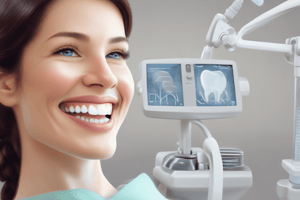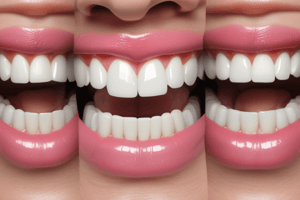Podcast
Questions and Answers
What is the differential diagnosis for Type 1 gingival smile?
What is the differential diagnosis for Type 1 gingival smile?
- Increased keratinized gingiva width (correct)
- Attached gingiva
- Osseous crest at CEJ
- Normal keratinized gingiva width
What constitutes the subgroup for Type 2 gingival smile?
What constitutes the subgroup for Type 2 gingival smile?
- Attached Ging Free Ging M
- Attached Ging 0
- Free Ging M
- Normal KG (correct)
Where can the '10 Commandments of Smile Esthetics' be found?
Where can the '10 Commandments of Smile Esthetics' be found?
- Balance Smile Overview
- Dental Components Prostho, Perio, Restorative
- Contemporary Orthodontics. 5th edition Elsevier
- Maringá July/August 2014 (correct)
What is the main topic of the article by Robert A Levine in the Compendium of continuing education in dentistry?
What is the main topic of the article by Robert A Levine in the Compendium of continuing education in dentistry?
What is the focus of the article in the JCO Online archive from March 2005?
What is the focus of the article in the JCO Online archive from March 2005?
Where can information about Altered Passive Eruption Diagnosis and Treatment be found?
Where can information about Altered Passive Eruption Diagnosis and Treatment be found?
What is the common focus of the articles by Proffit W. in the Contemporary Orthodontics book?
What is the common focus of the articles by Proffit W. in the Contemporary Orthodontics book?
What is described as Type 2 in the Differential Diagnosis of Gingival Smile?
What is described as Type 2 in the Differential Diagnosis of Gingival Smile?
Which component of a balanced smile refers to the anteroposterior position of the jaws in relation to the cranial base?
Which component of a balanced smile refers to the anteroposterior position of the jaws in relation to the cranial base?
What type of smile is characterized by elevators of the upper lip?
What type of smile is characterized by elevators of the upper lip?
Which percentage of the population is associated with the commissure smile?
Which percentage of the population is associated with the commissure smile?
In the context of a balanced smile, what does the term 'macroesthetics' refer to?
In the context of a balanced smile, what does the term 'macroesthetics' refer to?
According to Dr. David Sarver, which component of a balanced smile focuses on the rest position?
According to Dr. David Sarver, which component of a balanced smile focuses on the rest position?
What is the primary focus of the transverse dimension in relation to a balanced smile?
What is the primary focus of the transverse dimension in relation to a balanced smile?
'Asymmetry' in the context of smile aesthetics is addressed in which type of smile?
'Asymmetry' in the context of smile aesthetics is addressed in which type of smile?
'Rest position' in the context of a balanced smile is primarily associated with which component?
'Rest position' in the context of a balanced smile is primarily associated with which component?
'Smile (profile)' also addresses which aspect in addition to the anteroposterior position of jaws and incisor inclination?
'Smile (profile)' also addresses which aspect in addition to the anteroposterior position of jaws and incisor inclination?
'Bracket Positioning for Smile Arc Protection' is discussed in which publication?
'Bracket Positioning for Smile Arc Protection' is discussed in which publication?
What type of smile is static, sustained, and fairly reproducible?
What type of smile is static, sustained, and fairly reproducible?
Which smile involves the contraction of both zygomaticus major and orbicularis oculi muscles?
Which smile involves the contraction of both zygomaticus major and orbicularis oculi muscles?
What have researchers used to differentiate Duchenne smiles from non-Duchenne smiles for biometric applications?
What have researchers used to differentiate Duchenne smiles from non-Duchenne smiles for biometric applications?
How many components are included in a balanced smile?
How many components are included in a balanced smile?
Which type of smile should expose minimal gingiva and have symmetric and harmonious gingival contour?
Which type of smile should expose minimal gingiva and have symmetric and harmonious gingival contour?
What can gummy smiles be classified into based on the amount of gingival display?
What can gummy smiles be classified into based on the amount of gingival display?
What can result in altered passive eruption and affect the smile?
What can result in altered passive eruption and affect the smile?
What increases dramatically during adolescence and tapers off in later years?
What increases dramatically during adolescence and tapers off in later years?
What can impact orthodontic diagnosis and treatment planning?
What can impact orthodontic diagnosis and treatment planning?
What type of treatment options can vary for gummy smile?
What type of treatment options can vary for gummy smile?
Flashcards are hidden until you start studying
Study Notes
- Smile can be classified into two types: posed and spontaneous
- Posed smile is static, sustained, and fairly reproducible, while spontaneous smile is involuntary and represents enjoyment or maximal contraction
- Duchenne smile, also known as a genuine or true smile, involves the contraction of both zygomaticus major and orbicularis oculi muscles
- Researchers have used active appearance models to differentiate Duchenne smiles from non-Duchenne smiles for biometric applications
- Eight components of a balanced smile include vertical dimension, incisor display at rest and during speech and smile, philtrum and intercommissural distances, smile arc, incisor show on smile versus rest versus speaking, and upper lip curvature and length
- Interactions of hard tissues, soft tissues, and growth over time can impact orthodontic diagnosis and treatment planning
- Ideal smile should expose minimal gingiva (unless young or female), have symmetric and harmonious gingival contour, and have anterior and posterior segments in harmony with the smile arc
- Gummy smile can be classified into degrees based on the amount of gingival display, and treatment options can vary from orthodontics to orthognathic surgery
- Measurements for accurate decision making in orthodontics include clinical and anatomic crown length, width of keratinized tissue, and radiographic location of the cemento-enamel junction
- Incisor crown height increases dramatically during adolescence and tapers off in later years, and interactions of hard tissues, soft tissues, and growth over time can impact orthodontic diagnosis and treatment planning
- Short tooth syndrome can result in altered passive eruption, which can affect the smile and require treatment management.
Studying That Suits You
Use AI to generate personalized quizzes and flashcards to suit your learning preferences.




